Looking to address the skill gap among state workers, Wisconsin lawmakers are pushing for more technical education and career development.
Over the past few decades, the importance of technical education has decreased for different reasons, ranging from technological developments to perceptions that technical institutions are not worthwhile, Noel Radomski, director of the Wisconsin Center for the Advancement of Postsecondary Education, said.
Now, a task force of lawmakers is looking to revive technical education, even if methods differ across the political aisle.
Motives for pushing technical education
Radomski said Wisconsin has a skill gap because of the decline in people enrolling in technical education. Machines took over jobs that previously required manual labor, pushing people to get more sophisticated degrees like masters and doctorates.
Contributing to this trend is the fact that public high schools began emphasizing degrees from four-year colleges rather than technical schools, creating an overall shortage of technically educated workers, Radomski said.
Rep. Bob Kulp, R-Stratford, said many school districts also found it difficult to provide machinery and other materials to get students interested in technical education, our didn’t know how to integrate those options into their existing course offerings.
“We’re not trying to say that two-year technical education is the only way to make it,” Kulp said. “It’s that it’s a very viable alternative and students should know about it.”
Radomski said emphasizing technical education could also help students attend higher education institutions. Some students don’t go to college because of bad grades in high school or lack of interest in staying in school for four years. For such students, attending technical college could be a better option, he said.
Measures to improve, increase technical education
The bipartisan state Legislature’s Task Force on Youth Workforce Readiness is one measure legislators have to discuss legislative action that could be taken to address obstacles for technical education, Kulp said.
“We are looking to uncover any barriers that are in the whole structure of things from higher ed to participation of the private sector in schools,” Kulp said.
Kulp said these barriers, which are outlined in a report by the task force, include things like educators’ lack of knowledge on technical workforce development and lack of funds for technical education materials.
Wisconsin does have a some programs in place to address some of these issues. Students can take a test similar to the ACT to obtain a certificate that will allow them to work in a technical job after graduation. Kulp said the task force recommends schools educate students about this test.
These are the college affordability bills Walker just signed into law
But Rep. Katrina Shankland, D-Stevens Point, said the task force’s original report does not address several concerns Democrats have raised and lacks details.
Shankland, who is also the vice-chair of the task force, said Democrats on the task force were not given the opportunity to review the original report, but have released their own report. It includes suggestions like increasing transportation so that more students can access technical education institutions and career opportunities.
Shankland Wisconsin can connect students to opportunities by increasing access to apprenticeships, dual enrollment, internships and part-time jobs. Shankland said the Democrats’ report also included allowing credit transfers between technical and non-technical institutions.
“More students should take advantage of those and should work to have as many college credits they can before they graduate not only to help them reduce student loan debt but also to ensure they’re getting hands on experience even before college should they choose to go that route,” Shankland said.
Gov. Scott Walker’s college affordability package emphasized technical education over other four-year institutions like those in the University of Wisconsin System. When the UW System faced a $250 million cut in the 2015-17 budget, technical institutions received more grants, Radomski said.
$250 million cut to UW System remains as Assembly passes state budget
But Kulp said UW System has been a strong partner and has encouraged the development of technical institutions. There are some credit transfer issues that the institutions are working to solve, but aside from that, they are working well together.
Lawmakers discuss merging UW Colleges and Extension and Wisconsin Tech System
“We think we’re ready to go for next session in order to not only strengthen the workforce but also our economy and ensuring that everyone has opportunities to succeed,” Shankland said.
Catherine Guden contributed to reporting for this article.

















